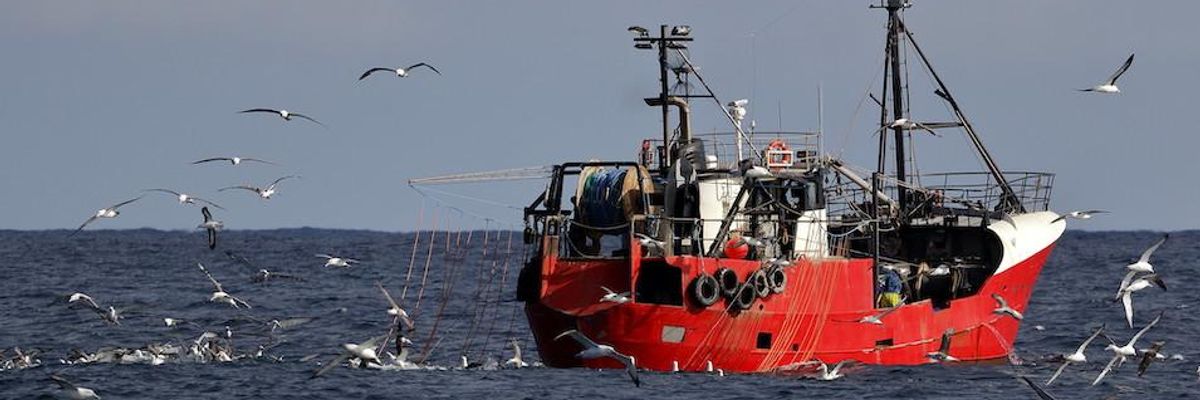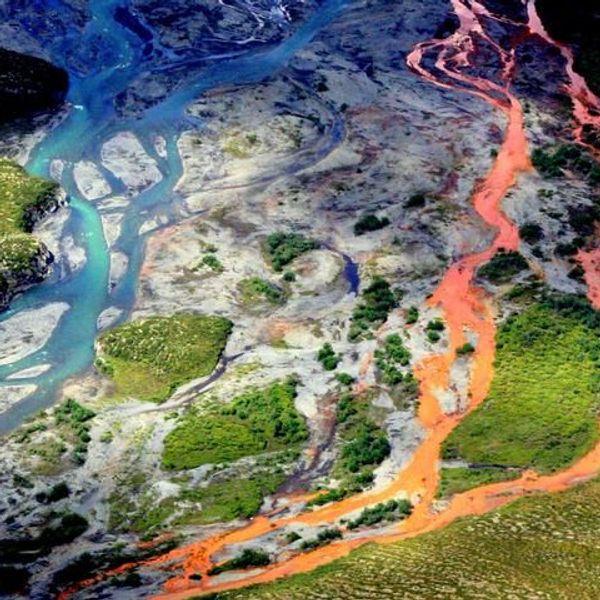
The climate crisis is changing the New England fishing industry, a new report says. (Photo: Ed Dunens/Flickr/cc)
New England Fishing Communities Being Destroyed by 'Climate Shocks': Study
"There are communities that are just not going to be fishing communities anymore."
The climate crisis is hurting the New England fishing industry, claims a new report published Monday, with a decline of 16% in fishing jobs in the northeastern U.S. region from 1996 to 2017 and more instability ahead.
University of Delaware researcher Kimberly Oremus' paper, "Climate variability reduces employment in New England fisheries," was published in the Proceedings of the National Academy of Sciences.
"This is an important signal to incorporate into the fisheries management process," Oremus told Science X. "We need to figure out what climate is doing to fisheries in order to cope with it."
Oresmus found that the fishing industry is in trouble due to variations in ocean temperature. Of particular concern is the Gulf of Maine, an area of the ocean warming faster than nearly any other in the world.
"New England waters are among the fastest-warming in the world," said Oremus said. "Warmer-than-average sea-surface temperatures have been shown to impact the productivity of lobsters, sea scallops, groundfish, and other fisheries important to the region, especially when they are most vulnerable, from spawning through their first year of life."
As The New Food Economy explained, the New England fishing industry has been under threat for decades due to overfishing and climate change.
Due to overfishing, cod stocks are nearly depleted. To avert complete collapse, the National Oceanic and Atmospheric Administration now sets limits on fish catches, or quotas. In the past decade, catches have plummeted, from 100 million pounds of cod in the early 1980s to a fraction today.
Oresums told HuffPost's Alexander Kaufman that while her research shows the fisheries' decline is driven by warmer winters, she wasn't able to get a full picture of the crisis.
"This doesn't capture all the anthropogenic climate change," said Oresmus. "There's probably additional warming on top of the variability that I don't account for."
According to Kaufman:
The Gulf of Maine, which stretches from Nova Scotia in Canada to Cape Cod, Massachusetts, has warmed faster than 99% of global oceans, increasing by an average of 0.11 degrees Fahrenheit per year over the past three decades. While temperatures fluctuate, melting Arctic ice is weakening the southward current that once flushed the basin with cold waters from Greenland, putting the basin's temperatures on a firm upward trajectory.
The effects have made the fishing industry even less predictable than in years past. Record lobster hauls over the past decade in Maine now look set to decline, according to two studies published in the past month. The New England fishery for Northern shrimp, once a winter mainstay, is set to remain closed for a seventh consecutive year. An iconic seafood processing firm in Gloucester, Massachusetts, went bankrupt in May.
Ultimately, Oresmus told The New Food Economy, New Englanders have to prepare for a different-looking coastal future.
"The individuals who can't weather these climate shocks are the small mom-and-pop businesses and smaller fishing establishments," said Oresmus. "There are communities that are just not going to be fishing communities anymore."
An Urgent Message From Our Co-Founder
Dear Common Dreams reader, The U.S. is on a fast track to authoritarianism like nothing I've ever seen. Meanwhile, corporate news outlets are utterly capitulating to Trump, twisting their coverage to avoid drawing his ire while lining up to stuff cash in his pockets. That's why I believe that Common Dreams is doing the best and most consequential reporting that we've ever done. Our small but mighty team is a progressive reporting powerhouse, covering the news every day that the corporate media never will. Our mission has always been simple: To inform. To inspire. And to ignite change for the common good. Now here's the key piece that I want all our readers to understand: None of this would be possible without your financial support. That's not just some fundraising cliche. It's the absolute and literal truth. We don't accept corporate advertising and never will. We don't have a paywall because we don't think people should be blocked from critical news based on their ability to pay. Everything we do is funded by the donations of readers like you. Will you donate now to help power the nonprofit, independent reporting of Common Dreams? Thank you for being a vital member of our community. Together, we can keep independent journalism alive when it’s needed most. - Craig Brown, Co-founder |
The climate crisis is hurting the New England fishing industry, claims a new report published Monday, with a decline of 16% in fishing jobs in the northeastern U.S. region from 1996 to 2017 and more instability ahead.
University of Delaware researcher Kimberly Oremus' paper, "Climate variability reduces employment in New England fisheries," was published in the Proceedings of the National Academy of Sciences.
"This is an important signal to incorporate into the fisheries management process," Oremus told Science X. "We need to figure out what climate is doing to fisheries in order to cope with it."
Oresmus found that the fishing industry is in trouble due to variations in ocean temperature. Of particular concern is the Gulf of Maine, an area of the ocean warming faster than nearly any other in the world.
"New England waters are among the fastest-warming in the world," said Oremus said. "Warmer-than-average sea-surface temperatures have been shown to impact the productivity of lobsters, sea scallops, groundfish, and other fisheries important to the region, especially when they are most vulnerable, from spawning through their first year of life."
As The New Food Economy explained, the New England fishing industry has been under threat for decades due to overfishing and climate change.
Due to overfishing, cod stocks are nearly depleted. To avert complete collapse, the National Oceanic and Atmospheric Administration now sets limits on fish catches, or quotas. In the past decade, catches have plummeted, from 100 million pounds of cod in the early 1980s to a fraction today.
Oresums told HuffPost's Alexander Kaufman that while her research shows the fisheries' decline is driven by warmer winters, she wasn't able to get a full picture of the crisis.
"This doesn't capture all the anthropogenic climate change," said Oresmus. "There's probably additional warming on top of the variability that I don't account for."
According to Kaufman:
The Gulf of Maine, which stretches from Nova Scotia in Canada to Cape Cod, Massachusetts, has warmed faster than 99% of global oceans, increasing by an average of 0.11 degrees Fahrenheit per year over the past three decades. While temperatures fluctuate, melting Arctic ice is weakening the southward current that once flushed the basin with cold waters from Greenland, putting the basin's temperatures on a firm upward trajectory.
The effects have made the fishing industry even less predictable than in years past. Record lobster hauls over the past decade in Maine now look set to decline, according to two studies published in the past month. The New England fishery for Northern shrimp, once a winter mainstay, is set to remain closed for a seventh consecutive year. An iconic seafood processing firm in Gloucester, Massachusetts, went bankrupt in May.
Ultimately, Oresmus told The New Food Economy, New Englanders have to prepare for a different-looking coastal future.
"The individuals who can't weather these climate shocks are the small mom-and-pop businesses and smaller fishing establishments," said Oresmus. "There are communities that are just not going to be fishing communities anymore."
The climate crisis is hurting the New England fishing industry, claims a new report published Monday, with a decline of 16% in fishing jobs in the northeastern U.S. region from 1996 to 2017 and more instability ahead.
University of Delaware researcher Kimberly Oremus' paper, "Climate variability reduces employment in New England fisheries," was published in the Proceedings of the National Academy of Sciences.
"This is an important signal to incorporate into the fisheries management process," Oremus told Science X. "We need to figure out what climate is doing to fisheries in order to cope with it."
Oresmus found that the fishing industry is in trouble due to variations in ocean temperature. Of particular concern is the Gulf of Maine, an area of the ocean warming faster than nearly any other in the world.
"New England waters are among the fastest-warming in the world," said Oremus said. "Warmer-than-average sea-surface temperatures have been shown to impact the productivity of lobsters, sea scallops, groundfish, and other fisheries important to the region, especially when they are most vulnerable, from spawning through their first year of life."
As The New Food Economy explained, the New England fishing industry has been under threat for decades due to overfishing and climate change.
Due to overfishing, cod stocks are nearly depleted. To avert complete collapse, the National Oceanic and Atmospheric Administration now sets limits on fish catches, or quotas. In the past decade, catches have plummeted, from 100 million pounds of cod in the early 1980s to a fraction today.
Oresums told HuffPost's Alexander Kaufman that while her research shows the fisheries' decline is driven by warmer winters, she wasn't able to get a full picture of the crisis.
"This doesn't capture all the anthropogenic climate change," said Oresmus. "There's probably additional warming on top of the variability that I don't account for."
According to Kaufman:
The Gulf of Maine, which stretches from Nova Scotia in Canada to Cape Cod, Massachusetts, has warmed faster than 99% of global oceans, increasing by an average of 0.11 degrees Fahrenheit per year over the past three decades. While temperatures fluctuate, melting Arctic ice is weakening the southward current that once flushed the basin with cold waters from Greenland, putting the basin's temperatures on a firm upward trajectory.
The effects have made the fishing industry even less predictable than in years past. Record lobster hauls over the past decade in Maine now look set to decline, according to two studies published in the past month. The New England fishery for Northern shrimp, once a winter mainstay, is set to remain closed for a seventh consecutive year. An iconic seafood processing firm in Gloucester, Massachusetts, went bankrupt in May.
Ultimately, Oresmus told The New Food Economy, New Englanders have to prepare for a different-looking coastal future.
"The individuals who can't weather these climate shocks are the small mom-and-pop businesses and smaller fishing establishments," said Oresmus. "There are communities that are just not going to be fishing communities anymore."

